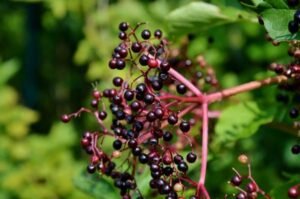Have you ever heard of the properties of elderberries? These fruits come from the elder tree, also scientifically known as Sambucus nigra L., which belongs to the caprofoliaceae family and can be found mainly in the forests and river banks of different regions of Europe. Although the best known is the black or common elderberry, we can also find other species such as the red elderberry (Sambucus racemosa) and the lesser elderberry or yezgo (Sambucus ebulus) among others.

Whatever the species, some parts of this tree such as elderflower and / or its berries or fruits have been traditionally used as ingredients in some natural remedies due to their different medicinal properties. However, although the flowers of this tree are very beneficial, in the following article we will also focus on the contradictions of these fruits. Keep reading this article and discover everything you need to know about elderberries: properties, benefits and contraindications.
Nutritional composition of elderberries
The black or common elderberry, also scientifically known as Sambucus nigra L., is a tree originating in Europe that belongs to the family of the Caprifoliaceae. Although one of the parts that can be exploited from this tree are the flowers, below we discover the nutritional composition of elderberries:
- Acids: Elderberries mainly contain malic acid, citric acid, and oxalic acid. To a lesser extent, they also provide linoleic acid and linolenic acid.
- Elderberry essential oil: Although the elderflower contains a greater contribution, the berries also have oils such as alpha-terpineol, betulin, geranil and beta-amirin.
- Vitamins: The fruits of this tree contain vitamins A, B1, B2, B3, B7 and C.
- Minerals: it has potassium, iron, calcium, sodium, manganese, phosphorus, magnesium and zinc.
- Other Nutrients: Some of the other nutrients that elderberries provide are fiber, fructose, glucose and flavonoids (anthocyanins and quercetin).
Properties and benefits of elderberries
As we have observed in the previous section, elderberries have a wide variety of essential nutrients for health. As a consequence of this richness, the fruits of sambucus nigra are an excellent remedy for different conditions, as they have the following medicinal properties and benefits:
Prevents some heart disease
Elderberries are the food that has the highest concentration of quercetin, a flavonoid with powerful circulatory properties that help support both the health of the arteries and our circulatory system. Thanks to these properties, elderberries are one of the best foods for the heart and can prevent diseases such as cholesterol, hypertension and arteriosclerosis.
It is a good remedy for headaches
The fruit of this tree also has excellent anti-inflammatory and analgesic properties, which is why it is considered a great remedy to reduce the discomfort caused by headaches.
To take advantage of these properties, berries are usually used to make a natural syrup, although in these cases you can also use elderberry essential oil. However, it is important that if you are going to make a home remedy such as syrup or elderberry oil with these berries, consume them always ripe, since those that are still green contain a high dose of sambunigrin, a very toxic principle.
It has astringent properties
Due to their high tannin content, the sambucus nigra berries have powerful astringent properties. And how can we benefit from these properties? Its astringent power gives it, on the one hand, laxative properties that improve some intestinal disorders such as constipation and, on the other hand, prevents the appearance of stomach bacteria such as Helicobacter pylori.
Elderberries for cough
Elderberry is also an excellent remedy to relieve coughs and other symptoms such as fever, as it has powerful sweat and antiviral properties. Thanks to these properties, the infusion of berries and elderflower is an effective remedy to promote the healing of some respiratory infections such as the flu, colds and bronchitis.
Reduces fluid retention
Thanks to their contribution of potassium salts, both elder flowers and elderberries have excellent diuretic properties that favor the elimination of toxins and accumulated liquids in the body. Due to this benefit, elderberry is an excellent remedy for some conditions such as gout and dropsy.
Elder dangers and contraindications
Although we have already seen what elderberry is for and we have discovered that its flowers and fruits can be a good remedy for different ailments, it is also important that we take certain precautions when consuming flowers or fruits of this tree:
- The use of remedies made from the bark, leaves and seeds of this tree is not recommended: on the one hand, the seeds contain cyanogenetic glycosides (which are cyanide generators) and, on the other hand, both the bark and its leaves count with a toxic principle known as sambunigrin.
- Nor should fruits that are immature or green be usedsince, as we have seen in the previous section, they also contain sambunigrin.
In addition to its toxicity, elderberry is contraindicated in the following cases:
- Pregnancy and lactation: Due to the lack of toxicological studies on the effects during pregnancy and lactation, it is not recommended to consume this plant in these cases.
- People with hypertension, varicose veins or poor circulation: before taking any remedy with elderberry, it is recommended that you consult with your doctor, as it could interfere with the medical treatments used for this type of case.








